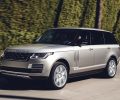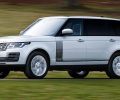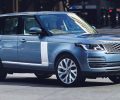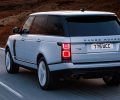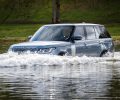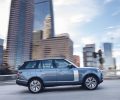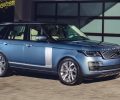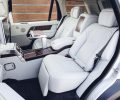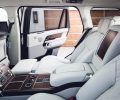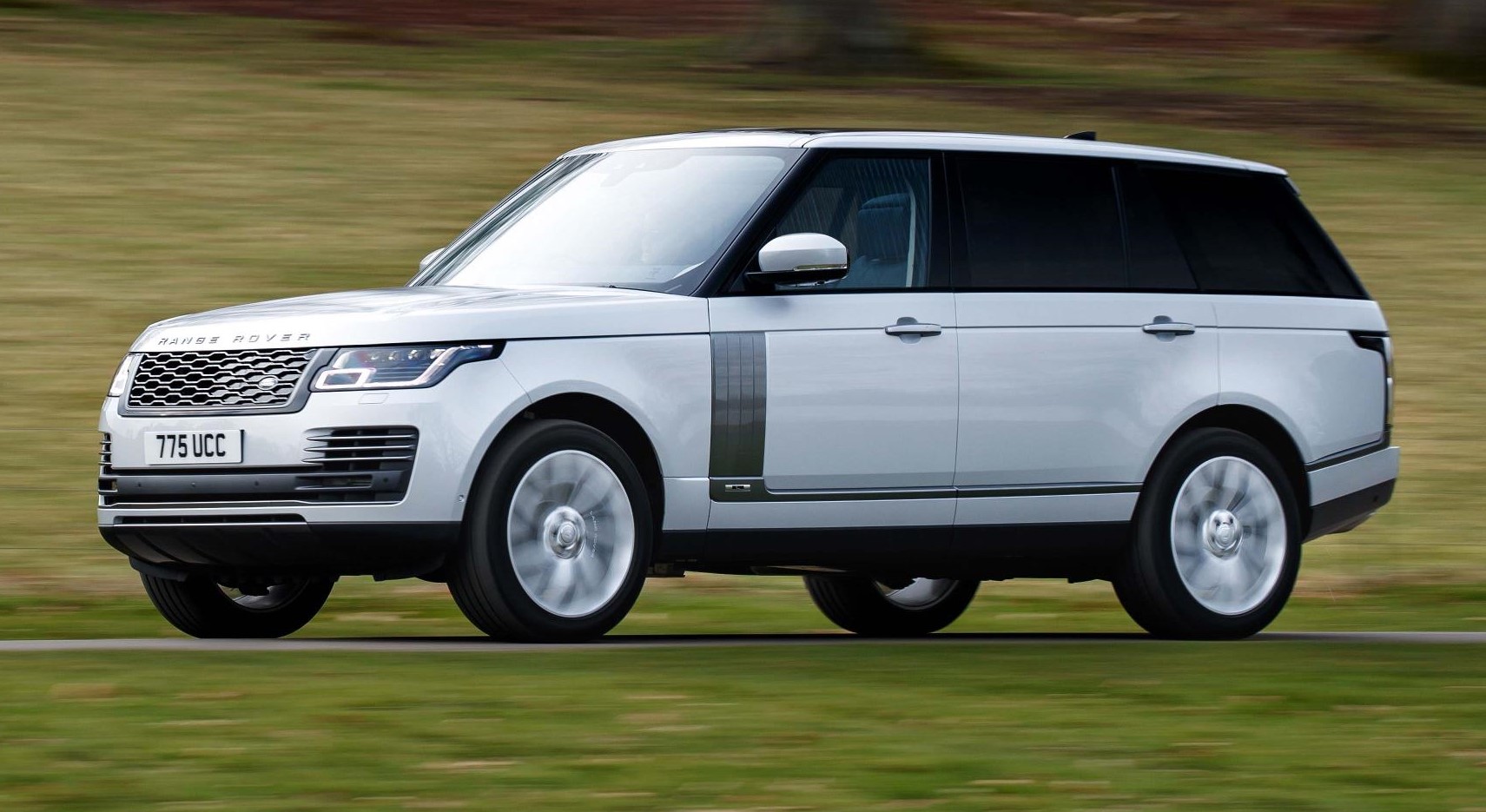
- New P400e Plug-In Hybrid Electric Vehicle (PHEV) powertrain delivers up to 31 miles (51km) of all-electric range1
- New Wade Sensing system provides real-time wading depth information relative the vehicle’s maximum wading capability2
- Expanded Advanced Driver Assistance System functionality includes available Active Cruise Control with Steering Assist3
- Long wheelbase SVAutobiography offers heightened luxury, craftsmanship with advanced convenience features
(MAHWAH, NJ) – August 7, 2018 – Today, Land Rover announced updates to the Range Rover model lineup for the 2019 model year. Updates include the introduction of a new P400e Plug-In Hybrid Electric (PHEV) powertrain, Wade Sensing system and expanded Advanced Driver Assistance System functionality.
US Models and MSRP4
| Trim Level | Powertrain | MSRP4 |
| Range Rover | 3.0L Supercharged V6; 340hp | $88,860 |
| Range Rover Td6 | 3.0L Turbocharged V6 diesel; 254hp | $90,860 |
| HSE | 3.0L Supercharged V6; 380hp | $94,050 |
| HSE P400e | PHEV 2.0L Turbocharged I4; 398hp | $95,150 |
| HSE Td6 | 3.0L Turbocharged V6 diesel; 254hp | $96,050 |
| Supercharged | 5.0L Supercharged V8; 518hp | $104,850 |
| Supercharged LWB | 5.0L Supercharged V8; 518hp | $108,895 |
| Autobiography | 5.0L Supercharged V8; 518hp | $141,995 |
| Autobiography LWB | 5.0L Supercharged V8; 518hp | $148,295 |
| SVAutobiography Dynamic | 5.0L Supercharged V8; 557hp | $177,200 |
| SVAutobiography LWB | 5.0L Supercharged V8; 557hp | $207,900 |
DESIGN
In almost 50 years of Range Rover history there has been one constant – peerless design. The Range Rover represents a sophisticated evolution of the SUV’s effortlessly elegant exterior and luxurious interior.
The flagship Land Rover SUV features a number of visual cues that are distinctive to Range Rover design – including the hallmark clamshell hood, which is both physically and visually longer to give the driver a cleaner view ahead. This modern appearance is accentuated by a front grille that incorporates a Gloss Black surround and available Atlas mesh, while the front bumper features widened vent blades.
“The uncluttered graphic of this Range Rover embodies the cleanliness and quality of design for which this nameplate has become known,” said Gerry McGovern, Chief Design Officer at Land Rover. “By combining iconic visual cues with modern aesthetic touches, such as flush detailing and an emphasis on overall cohesion, this is a luxury SUV like no other.”
Lower side vent and accent graphics incorporate two alternative design schemes – Satin body-colored and Atlas accent finish – that highlight the vehicle’s distinctive profile.
At the rear, the bumper integrates the exhaust tailpipes across all Range Rover powertrains alongside a selection of striking alloy wheel designs and metallic paint colors.
Two available exterior design packages offer customers additional options for personalization of the vehicle’s aesthetics. The Black Exterior Package changes key design accents to Narvik Black, including the hood and tailgate lettering, grille mesh and inner surround, front tow eye cover, front bumper vent finisher on Autobiography models, door mirror caps, side vent and accent graphics, door handle surrounds and tailgate finisher. The Shadow Exterior Package features a similar set of design upgrades, not including the door mirror caps, tow eye cover, tailgate finisher, but employs Shadow Atlas as the accent color.
As standard, all Range Rover models feature Premium LED Automatic Headlights with Signature LED Daytime Running Lights (DRL), Power Washers; optional Auto High Beam Assist3 is also available. Each headlight package features 24 LEDs per vehicle for enhanced illumination of the road ahead.
The interior of the Range Rover is as luxurious, adaptable and beautifully crafted as ever. Each sumptuous detail has been carefully designed and precision engineered with the comfort and enjoyment of its occupants in mind.
“The Range Rover’s interior provides a refined and spacious cabin with high quality materials that create a truly luxurious experience,” added McGovern. “By allying wide, comfortable seats with functional everyday stowage and the latest interior technology, we have created a striking and compelling design.”
Demonstrating the luxury and comfort evident throughout the vehicle, the front and rear seats are designed for optimized recline and legroom. The luxurious designs feature lines, leathers and layers of deep cushioning that create a cosseting lounge-style environment, with controls located on the door panels for customers to make adjustments.
For the next level in comfort, available 20-way Oxford Leather front seats are upholstered even more luxuriously and provide greater personalization opportunities. The leg cushions extend to support the thighs, while adjustable bolsters support occupants and can be equipped with cooling and massage functions.
With 24-way adjustment, the top-of-the-range Semi-Aniline Leather front seats are the most advanced option, providing upper shoulder support for total comfort, alongside integrated climate and massage settings, and the option of a stress-relieving Hot Stone massage function.
This high-end functionality extends to the rear, where the seats offer a 60:40 split-fold design. The power rear seat recline controls are also located on the door for greater convenience. The seats can also be folded using the infotainment touchscreen, providing load-through access and ensuring the luxury and refinement does not come at the expense of practicality.
Customers can choose powered reclining seats in Oxford or Semi-Aniline Leather with Intelligent Seat Cargo Mode. This allows for effortless folding of the flexible seats and access to the load space.
To minimise sound intrusion, the Range Rover features 0.24in (6mm) thick glass to ensure road, engine and wind noise do not disturb occupants – whether they are working or relaxing.
Executive Class Seating is fitted as standard to the Range Rover Autobiography LWB and SVAutobiography derivatives, elevating front and rear seat luxury with Semi-Aniline Leather and additional functionality.
Wider seat frames, deeper foams and plush comfort interlayers combine with a seat cushion that leads into a premium C-pillar treatment to create the impression of a luxurious wraparound lounge-like interior.
This sensation is enhanced by a power-deployable center console that is available at the touch of a button and features a break at the center footwell to enable rear passengers to easily exit from either side of the vehicle. When the center console is stowed, the rear cabin can accommodate three passengers in comfort.
When in use, the powered rear center console envelops occupants in luxurious leather, providing an elegant home for personal items. Passengers using the Rear Executive Class seating can recline their seatbacks up to 40-degrees, making the most of the additional 7.3in (186mm) of legroom (47.5in / 1,206mm in total) provided by the long wheelbase SUV, with no compromise to the rear load space.
A more immersive, relaxing experience can be achieved at the push of a button, moving the front passenger seat forward and folding the headrest down for greater visibility. In turn, this also reclines the rear seat, folds down the footrest (found at the rear of the front seat) and raises the calf rest, before deploying the center console.
The sense of serenity can be taken to new heights with the massage function that uses 14 cells in each seat to deliver a variety of relaxing massages. The Hot Stone massage function focuses heat into the four central massage elements while retaining a cool or ambient temperature throughout the rest of the seat, so passengers enjoy a more intense and effective experience. The seats produce continuous rolling waves across the back and gently apply heat to the spine.
The seat position, massage functionality, temperature of the seats and rear cabin climate control can all be managed from Land Rover’s Comfort Controller smartphone app. Not only does it allow users to control the massage type and intensity of vibration, it also enables customers to set a temperature and fan speed for the rear cabin. Heating and cooling functionality within the seats can also be controlled, as can the position – ideal if you are fully reclined and the door controls are out of reach. The finishing touch to the tranquil cabin in the Range Rover is the integration of heating into all armrests, front and rear.
Passengers benefit from a series of flexible storage solutions, including front cup holders that can be slid forward to reveal a deep storage area of up to 0.16-cu ft (4.5-liters) in the center console with a dedicated USB charging port.
The lockable glove box provides enhanced security, while customers can specify an optional cooler compartment or a refrigerator in the front center console that holds four 16.9oz (500ml) bottles and chilling to 41° F (5° C).
The front and rear door bins are shaped to hold larger 1.5-liter bottles and, in long wheelbase models, a rear cubby box offers 0.10-cu ft (2.8-liters) of additional storage. At the rear of the central console is a domestic plug socket, while a second can be found in the load space.
An optional cabin air ionization system, called Nanoe™, assists in improving air quality inside the vehicle. The system uses nano-sized charged water particles which ionize particles in the air, making them attract to surfaces and thus help to cleanse the air.
The powered roof sunblind can be opened and closed using an advanced gesture control system capable of sensing the movement of a hand. All it takes to open the sunblind is a rearward swipe in front of the rear-view mirror, while a simple forward motion will prompt the blind to close. Comfortable and convenient, the intuitive system also reduces potential distraction to the driver.
In addition, the blind can be closed automatically when the vehicle is locked helping to keep the interior cool in warm weather. When the driver opens the door, the sunblind will automatically slide open. The sunblind can also be operated with conventional buttons, if preferred.
The Range Rover offers customers control over the cabin environment with configurable three-zone ambient lighting. Occupants can tailor the atmosphere to create a calm, relaxing environment by choosing from up to 10 different color options and configuring intensity of the lighting via fully controllable tri-color LEDs in the B-pillars, doors, center console and footwells.
PLUG-IN HYBRID VEHICLE (PHEV) TECHNOLOGY
The Range Rover P400e features the first Plug-In Hybrid Electric Vehicle (PHEV) powertrain from Jaguar Land Rover. The P400e is capable of driving up to 31 miles (51km) with zero tailpipe emissions when driven in all-electric mode1.
The P400e powertrain combines an advanced 296hp (221kW) turbocharged four-cylinder Ingenium gasoline engine with an 114hp (105kW) electric motor. This transformational technology is powered by an advanced 13.1kWh lithium-ion battery giving a total available power output of 398hp (297kW) from the permanent four-wheel drive (4WD) system5.
Together they propel the Range Rover P400e from 0-60mph in 6.4 seconds (0-100km/h in 6.8 seconds) and to a top speed of 137mph6. With an impressive 472 lb-ft of torque, the PHEV powertrain mixes dynamic and sustainable performance with traditional Range Rover capability, comfort and refinement.
The combination of Ingenium gasoline and electric power can be used in two driving modes: Parallel Hybrid mode (the default driving mode) and EV (Electric Vehicle) mode.
In Parallel Hybrid mode the P400e can intelligently and seamlessly combine the two power sources to make efficient progress. By using its electrical energy reserves intelligently, the P400e provides the power and capability customers demand from a Range Rover.
On longer journeys, customers can use the ‘SAVE’ function to deploy the EV-only range for a specific part of their journey, for example, when entering congested urban areas.
The access point for the 7kW on-board charging socket is located behind the Land Rover badge on right of the grille, at the front of the vehicle, while the 13.1kWh prism-shaped lithium-ion battery is mounted at the rear beneath the trunk floor – a full charge can be achieved in approximately 2 hours and 45 mins using a 220V/32Amp dedicated charger7.
The PHEV model is available a home charging lead, which connects to domestic power supplies, as standard.
Timed charging is also available via the vehicle’s infotainment system, which allows owners to choose the most appropriate time to begin charging.
Owners can monitor the charging status via two illuminated strips that sit on either side of the charging socket. A white light signifies the vehicle is connected and charging has not started, while a blue light indicates that timed charging is set but not underway. A flashing green signal shows the car is charging, while a solid green light indicates the battery is full.
Customers can use the Land Rover InControl® Remote™ app to remotely monitor the charge status, receiving alerts if there is an error or if the charging cable has been removed.
The gasoline engine and electric motor of the P400e have been calibrated to work in perfect harmony, with two charge management functions available when in Parallel Hybrid mode:
- Predictive Energy Optimization (PEO) helps to make the most of both power sources and is activated when the driver enters a destination into the navigation system. By analyzing the traffic, gradient of the route and whether it is an urban or rural environment, the PHEV system is designed to seamlessly combine electric and gasoline engine power to optimize efficiency. This is not available when the vehicle is in Sport mode.
- The driver-selectable SAVE mode is accessed through the vehicle’s touchscreen and maintains battery charge at the point of activation. At this point, the vehicle will only use the electric motor once it has replenished enough energy via regenerative braking or charging, allowing customers to conserve electric power to be used on a specific part of their journey.
The operation of the PHEV powertrain is supported by an advanced eight-speed automatic transmission, which features lightweight construction and delivers the supreme refinement and assured responses expected from the Range Rover.
GASOLINE AND DIESEL POWERTRAINS
For the 2019MY, a lineup of V6 and V8 powertrains will continue to be offered for the Range Rover alongside the PHEV.
A 3.0L turbocharged V6 diesel is available exclusively in the standard Range Rover and HSE models, offering 254hp and 443 lb-ft of torque, while two 3.0L supercharged V6 gasoline engines offer outputs of 340 and 380hp and a top speed of 130mph6.
A next-generation 5.0L supercharged V8 gasoline engine is also available on standard and long wheelbase Supercharged and Autobiography models offering 518hp, 461 lb-ft of torque and a 0-60mph time as low as 5.1 seconds (0-100km/h in 5.4 seconds)6 on standard wheelbase vehicles.
TECHNOLOGY
The Range Rover features the latest available technology, including the Land Rover InControl® Touch™ Pro Duo™ infotainment system, voice recognition and a suite of connectivity features.
InControl Touch Pro Duo™
Two high-definition 10-inch touchscreens form the centerpiece of the minimalist cabin with Touch Pro Duo. Fast and intuitive, it combines finely engineered physical controls and a beautiful digital interface to deliver a truly connected driving experience8.
The system looks simultaneously futuristic and elegant thanks to the interlinked touchscreens that provide clear graphics and ease of operation with familiar tap, swipe and pinch-to-zoom control gestures on the upper screen8. The customizable home screen also allows customers to create shortcuts to preferred features.
The Touch Pro Duo system allows drivers to keep mapping information displayed on the upper touchscreen, while providing easy access to further features on the secondary lower display. By dividing information and controls logically between the two, the Range Rover achieves a more intuitive user experience.
The upper screen on the central console can be angled to counter glare and assist with visibility while the fixed lower display operates as the control panel and manages more functional tasks such as climate control, seat and vehicle settings.
Positioned on either side of the lower screen are two rotary dials, which can be used to control the cabin temperature, fan speed, seat climate and massage functions. These can also be used to manage media and phone functionality via specialist widgets when the upper screen is in use.
The 12.3-inch high-resolution Interactive Driver Display includes dual dial, single dial and extended mode views. Other frequently used features – including phone, navigation and media settings – can also be managed using this cluster.
In addition, an optional second-generation Head-Up Display (HUD) system puts vital information in the driver’s line of sight. Using full-color projection, it presents essential information on the windshield, such as vehicle speed and navigation directions, as well as other updates such as adaptive cruise control settings and Advanced Driver Assistance alerts such as signals from the Traffic Sign Recognition system.
The full-color image is generated using four super-bright LEDs and a high-resolution TFT LCD screen. The image is sharper than previous HUDs, up to 66 percent brighter and more than twice the size of other systems, allowing customers to adjust the layout, height and brightness of the display.
The steering wheel controls feature intuitive capacitive switches and dynamic illuminated icons assisting in making the operation of vehicle’s features from behind the wheel simpler.
The user-friendly switches provide full control of the instrument cluster, with media playback, phone, cruise control and heated steering wheel settings, plus a shortcut to a feature of the driver’s choosing. The capacitive ‘wheel’ within the controls also allows users to scroll through menus by finger or thumb.
Working closely with Nuance, a global leader in voice recognition technology, the Range Rover system is stored in a solid-state drive to ensure instant responses. The voice recognition system is able to recognize more conversational interaction in English and Chinese Mandarin, as well as offering helpful error feedback.
The Range Rover also features exclusive Land Rover Remote Intelligent Seat Fold technology on models with power recline rear seats, allowing customers to reconfigure the first- and second-row seats remotely via a smartphone app as part of the InControl Touch Pro Services.
Passengers of the Range Rover also benefit from convenience technologies including an optional 10-inch rear seat touchscreen entertainment system and up to 17 connection points integrated discreetly throughout the cabin. Connections in the front row include USB, HDMI and 12V ports in the front center console, 12V socket in the glove box, and USB connection in the deep storage area underneath the cupholders. In the second row, there is a 12V port, a domestic plug socket, USB and HDMI ports, while the load space also provides a 12V port and a second domestic plug socket to keep laptops and other devices charged. In long wheelbase models, an additional USB charge point can be found in the storage box at the rear of the center console.
A Wi-Fi hotspot connection capable of supporting up to eight devices is also available, which enables connectivity on the move9.
For extra convenience, the innovative Land Rover Activity Key wristband is available, allowing customers to lock and unlock the vehicle without using the standard key fob. Perfect for runners, swimmers or cyclists who don’t want to carry a traditional key while exercising, the durable Activity Key is waterproof to depths of 59ft (18m) and is designed to withstand temperatures ranging from -58° F to 257° F (-50° C to 125° C).
To lock or unlock the vehicle, the Activity Key must be held within 1.2in (30mm) of the second “R” of the Range Rover badge on the tailgate. Once activated, the main vehicle key fob is disabled and can be left safely inside the cabin.
Advanced Driver Assistance Systems
The suite of driver assistance features on the Range Rover includes core elements such as Lane Departure Warning and Emergency Braking10, cruise control and speed limiter, all fitted as standard3.
The available Drive Pack adds features to inform and equip customers for any journey. Central to this are Blind Spot Monitor with Closing Vehicle Sensing, Adaptive Speed Limiter, Driver Condition Monitor and Traffic Sign Recognition3.
The optional Drive Pro Pack features High Speed Emergency Braking10, Blind Spot Assist, Lane Keep Assist, Traffic Sign Recognition, Adaptive Speed Limiter, Driver Condition Monitor and, from 2019 model year, Adaptive Cruise Control with Stop & Go3. This system uses a forward-facing camera and improved radar system to assist the vehicle in maintaining a set gap from the vehicle ahead3. This enables the driver to follow the vehicle in front to a complete stop and pull away automatically if stationary for less than three seconds3. Beyond this, the vehicle can be prompted to resume with a tap of the accelerator or via a button on the steering wheel.
The optional Park Pack includes a 360-degree Parking Aid, Rear Traffic Monitor and Clear Exit Monitor, which alerts passengers exiting from the rear doors to potential hazards approaching from behind3. If a vehicle is detected, a light flashes on the door to notify those attempting to open the rear door when a hazard is approaching3.
The optional Park Pro Pack includes all of the above features with the addition of Park Assist – a suite of advanced automated parking features that aid parallel and perpendicular parking3.
A new Driver Assist Pack is also available from 2019 model year and includes all of the features within the Drive Pro and Park Pro packs, with the addition of Adaptive Cruise Control with Steering Assist. While the driver is required to keep their hands on the wheel, this systems works with the driver to assist in keeping the vehicle centered in the lane by applying moderate steering interventions at speeds up to 112mph (180km/h) 3,6.
Meridian Audio Systems
The Meridian™ audio systems in the Range Rover have been designed with meticulous attention to detail and a focus on finding optimum positions for every speaker around the cabin to deliver three-dimensional sound quality. These are available with three levels of functionality from the 380W, 825W surround or 1700W Signature Sound Systems, providing 13, 19 and 29 speakers respectively and including a dual-channel subwoofer in each.
ENGINEERING
Capability with composure on a variety of terrains and conditions is a core part of the Range Rover experience. With an advanced suspension system that combines poise and stability with remarkable ride isolation for flat, confident cornering, customers get a natural and intuitive feel behind the wheel3.
Comprising of a fully independent lightweight wide-spaced double wishbone front and an advanced multi-link rear design, the suspension layout perfectly complements the advanced aluminum construction of the vehicle.
In order to achieve a fine balance of agility, composure and comfort, the Land Rover engineering team focused on optimizing chassis stiffness and fine-tuning the steering system to deliver the exhilarating driving experience demanded of the Range Rover.
The chassis can be managed via a number of advanced technologies. Dynamic Response enables a driver to independently control the front and rear axles with an enhanced active body roll control system, which helps improve low-speed agility and can help increase stability at speed3.
This is complemented by an available Active Rear Locking Differential to aid in traction and stability in corners, while Adaptive Dynamics provide continuous variable damping for a supple, composed ride3.
All-Terrain Capability
The renowned off-road capability of the Range Rover further expands with the P400e, as its electric motor offers greater control of torque from a standstill. This facilitates improved low-speed control and superior pull-away on low-grip surfaces3. The low range transmission can also be operated in pure EV mode; bringing luxurious refinement to all-terrain journeys. The Land Rover Terrain Response® 2 technology is also able to distribute torque from the electric motor – which has no creep speed and maximum torque from zero rpm – to all four wheels. This assists with greater control during low-speed off-road maneuvers, reaffirming the vehicle’s outstanding breadth of capability3.
Handling and performance across remainder of the model range can also be managed via a series of Terrain Response 2 programs. This includes a Comfort mode, which calibrates the suspension settings to optimize ride comfort, while the Dynamic setting is designed to give the driver a more dynamic ride. These modes exist alongside Grass Gravel Snow, Mud/Ruts, Sand, Rock Crawl and Eco settings.
In Eco mode, the driver receives instantaneous feedback and guidance on driving more efficiently, while minimizing electrical power consumption and highlighting the effects of certain features on fuel efficiency. It also softens the throttle pedal response, modifies the automatic transmission shift pattern and switches off heating for the door mirrors, steering wheel and seats to optimize fuel efficiency.
The Range Rover also benefits from the brand’s unique Low Traction Launch System, which helps to exploit available traction when pulling away on low-traction surfaces3. Unlike All-Terrain Progress Control, the company’s all-terrain cruise control technology, Low Traction Launch initiates a unique throttle map to provide a more usable torque curve. The system is specifically designed to help drivers pull-away from a standstill on slippery surfaces such as wet grass, loose gravel and snow3.
Hill Descent Control is also fitted as standard, while excellent ground clearance and a smooth underfloor help the vehicle negotiate rough terrain3.
Wading capability for the P400e is also uncompromised with a maximum depth of 35.4in (900mm). For water wading, it is recommended that the Ingenium gasoline engine is running to prevent water entering the exhaust system.
For 2019MY, a Wade Sensing system will now be offered as an option on all US Range Rover derivatives. The system provides real-time wading depth information relative to the maximum wading capability for the current location of the vehicle2. Using sensors on the underside of the door mirrors, the system reports this information to the driver via a dedicated display on the vehicle’s touchscreen. The system also provides the driver an indication of the vehicle’s position/angle, and can estimate when the vehicle is potentially going into deeper water or coming out of the water2. The driver is able to turn on the Wade Sensing feature using a soft button in the 4x4i menu.
Four-Wheel Drive
The four-wheel-drive capability of the Range Rover is managed by a twin-speed transfer case design which has an actuator rather than a separate motor and ECU. This results in a 3.3lb (1.5kg) reduction in weight and is controlled via a multi-plate clutch. Together with the bevel gear center differential it provides a 50:50 torque split.
Using wheel slip information from a range of sensors, the clutch is designed to distribute torque evenly between all four wheels, while a ‘shift on the move’ system allows selectable high and low gears up to 37mph (60km/h). The Active Rear Locking Differential can also be optimized to assist in cornering stability and traction3.
Air Suspension
All Range Rover models come standard with four-corner air suspension.
When cruising at a speed of 65mph or above, the suspension can lower the vehicle by 0.6in (15mm) to reduce drag6.
Access Height lowers the vehicle by as much as 2.0in (50mm) to aid ingress and egress of the vehicle. This feature can also lock the suspension at this low level, enabling the Range Rover to travel at speeds of up to 25mph in locations with restricted height, such as multi-story parking lots.
Conversely, the ride height can be increased to cater to demanding off-road scenarios, with two bespoke options:
- Off-Road Ride Height 1 lifts the vehicle by as much as 1.6in (40mm) at speeds of up to 50mph6 and is ideal for driving on less demanding off-road conditions, such as deeply rutted dirt roads
- For more extreme landscapes or wading through water, Off-Road Ride Height 2 takes the car up to 3.0in (75mm) above its usual height at speeds of up to 31mph6
Owners are also able to control the height of the vehicle’s rear to help with loading and towing. This is managed through switches in the load space and can reduce rear ride height by 2.0in (50mm). In this instance, the front will drop by just 0.8in (20mm) and result in a hitch height reduction of 2.4in (60mm).
Conversely, the rear can also be lifted by as much as 3.5in (90mm) to assist in the hitching of trailers and the adjustment of trailer inclination while stationary. The suspension can be levelled by holding the up and down buttons simultaneously until the vehicle returns to normal.
This user-friendly set-up can also be managed via the key fob, which is particularly effective when the load space is in use and the switches are inaccessible.
Advance Towing Options
The Range Rover is also available with Advanced Tow Assist, which assists the driver in executing complicated reversing maneuvers by automatically steering the vehicle3.
All the driver has to do is operate the pedals and select the path of the trailer using the rotary Terrain Response controller on the center console. The path of the trailer is projected on the central touchscreen by a feed from the reverse camera and rotating the controller intuitively adjusts the guidelines ahead of the trailer.
Range Rover SVAutobiography
The Range Rover SVAutobiography delivers a combination of craftsmanship and technology, epitomising the pinnacle of luxury travel – making every journey a treasured experience whether driving or being driven. Available exclusively in long wheelbase, the luxury SUV combines advanced convenience features, including rear doors that close at the touch of a button, to create a sanctuary for relaxation that doubles as a mobile technology hub. The SVAutobiography features an uprated 557hp 5.0L supercharged V8 gasoline engine mated to a ZF® eight-speed automatic transmission which powers the halo model from 0-60mph in 5.2 seconds (0-100km/h in 5.5 seconds) 6.
# # #
1 Manufacturer-estimated up to 31 miles EV range with fully charged battery. Actual range may vary.
2 Driving in floodwaters or moving water should be avoided. Driving through water can be extremely dangerous, the Wade Sensing feature only detects depth of water the vehicle is in at the present time and not of water ahead or around the vehicle. Therefore, Wade Sensing cannot predict whether it is safe to proceed and cannot detect steep drops in grade around the vehicle. The driver is responsible for determining the conditions of the route being driven.
3 These systems are not a substitute for driving safely with due care and attention and will not function under all circumstances, speeds, weather and road conditions, etc. Driver should not assume that these systems will correct errors of judgment in driving. Please consult the owner’s manual or your local authorized Land Rover Retailer for more details.
4 All prices shown are Manufacturer’s Suggested Retail Price. Excludes $995 destination/handling charge, tax, title, license, and retailer fees, all due at signing, and optional equipment. Retailer price, terms and vehicle availability may vary. See your local authorized Land Rover Retailer for details.
5 Peak internal combustion engine and electric power not delivered at the same engine speed.
6 Always follow local speed limits.
7 Figures for charging are Manufacturer’s estimates based on best information available at time of publication. Charging time will vary by power supply and charging solution.
8 Do not use Land Rover InControl® features under conditions that will affect your safety or the safety of others. Driving while distracted can result in loss of vehicle control.
9 The Wi-Fi hotspot is intended for passenger use only. InControl features may require an additional subscription with separate terms and conditions.
10 Please note that if any action is taken, even minimal steering, the Emergency Braking/ High-speed Emergency Braking system will assume the driver resumed control of the vehicle and the system will automatically disengage.

